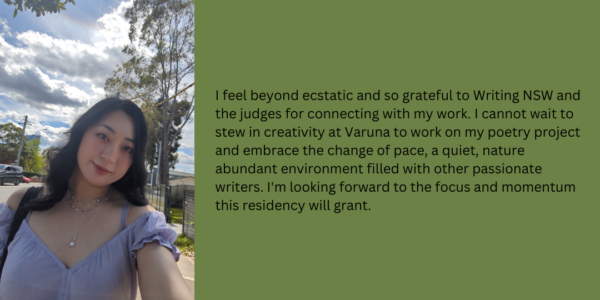The Writing NSW Varuna Fellowship is an annual competition open to members of Writing NSW. Winners receive a one week residential at Varuna in the Blue Mountains where they can develop their work, and meet and connect with fellow writers.
2024
J. Marahuyo won the Fellowship for her developing work of poetry, Disclosures of Violence. The judges found that the “. . . poems boldly and candidly explore the navigation of personal, social, and cultural identity. Lines are drawn and dissolved between self, family, community and diaspora; language becomes both weapon and salve; poetic form both holds space for and erupts with these bold disclosures. It was a unique voice that I want to hear more from.”
J is a neurodivergent Filipino-Australian award winning poet residing on Dharug country. She explores themes of identity, mental health and the power of vulnerability; her debut collection will be released early 2025 by WestWords Books. Her words are celebrated and published nationally and internationally and can be found in Cordite, FemAsia and Gems Zine as well as numerous print and digital anthologies. She won Living Stories Western Sydney Writing Prize 2024 and was shortlisted for the Newcastle Poetry Prize 2024. When she’s not writing you can find her pspsp-ing random cats, eating cookies or getting on the wrong train. Her instagram is @j_marahuyo
Kimberley Knight was awarded Runner Up for her collection of essays, Body of Communication. The judges commended the essays as being “. . . taut, clever writing that provides a unique take on true crime stories. The best essays and works of creative non-fiction challenge our received wisdoms, and in ‘Body of Communication’ the disparate fields of linguistics, anatomy, archival history and true crime are brought to bear on everything from cold cases to witness testimonies, Freudian slips to language loss.”
Kimberley lives and writes on Dharug Land in Western Sydney. Her creative non-fiction has been shortlisted and published in Australia and Overseas (Carve (US), Westerly, Kill Your Darlings), and she is recipient of the 2024 Eric Dark Flagship Fellowship (Varuna). When Kim’s not working on her PhD in adolescent language and literacy, she is working on Body of Communication a collection of essays that explain linguistic and communicative phenomenon with the aid of true crime.
Adrian Mouhajer was also awarded Runner Up for his work, Fighting to Fit In, a lyrical and moving coming-of-age story. His work was described by the judges as “. . . an artful exploration of identity and community from a queer, Muslim, Arab-Australian perspective, that immediately feels like an important contribution to the growing canon of Western Sydney literature.”
Adrian Mouhajer is a queer non-binary Lebanese-Australian writer and editor from Western Sydney. They have performed their poetry for Bankstown Poetry Slam, Queerstories, Eulogy for the Dyke Bar and Cement Fondu. Their work has been published with Sweatshop, Hardie Grant Books, SBS, Aniko Press and Diversity Arts Australia. They were Runner Up for the 2023 Writing NSW Varuna Fellowship, and shortlisted for the 2022 SBS Emerging Writers Competition and the 2021 Sydney Opera House Antidote Mentorship for Diverse Emerging Writers. Adrian edited the anthology, Stories Out West, which centres LGBTIQ+ First Nations and CALD writers with a connection to Western Sydney.
The judges for 2024 were author and journalist, Kavita Bedford; publisher at Pantera Press, Tom Langshaw; and author and Program Manager at Writing NSW, Katherine Pollock.
2023
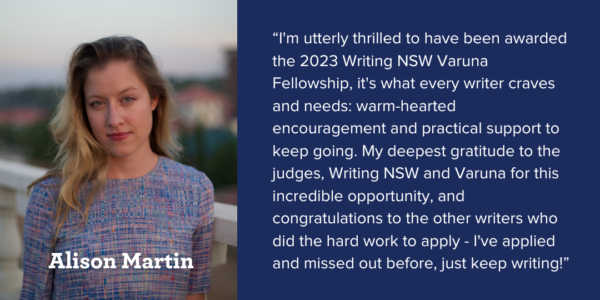
Alison Martin was awarded the fellowship for her novel The Wild, which she describes as “Part historical fiction about the last woman hanged in NSW, accused of murdering her husbands with rat poison; part political satire about the treatment of women in politics and society.” Alison’s work was a standout for all judges. The judges said, “Timely and important, vivid and lyrical, this entry showed extraordinary skill and potential.”
The two runners up for the Writing NSW Varuna Fellowship are Adrian Mouhajer and Susie Walsh. Adrian’s powerful poetry collection Haki Al Nas is an exploration of the Arab-Australian queer Muslim experience in Western Sydney. Susie’s lyrical meta-memoir My Broken Hearted Hill: Song Book of a Mining Town Girlhood delves into growing up Autistic in Broken Hill.
The judges for the 2023 Writing NSW Varuna Fellowship were human rights lawyer, community organiser, and writer Sara M Saleh; Fiction Publisher for HarperCollins and Voyager, Anna Valdinger; and Writing NSW Program Manager, Rowena Tuziak.
2022
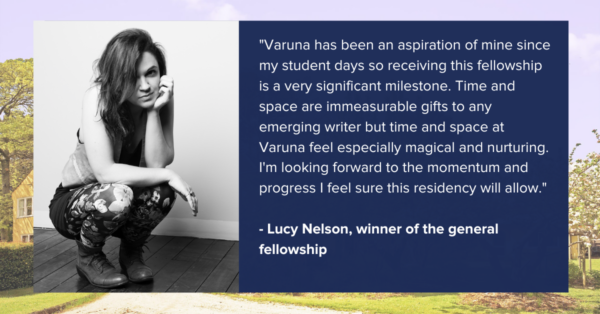
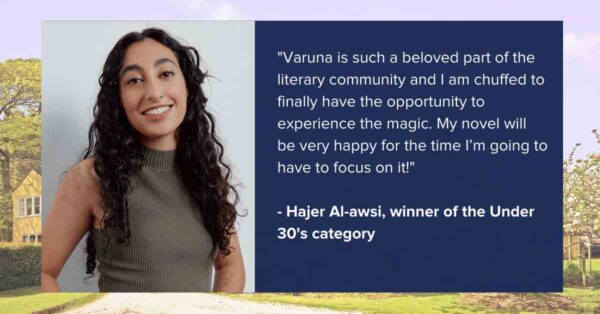
Lucy Nelson was awarded the general fellowship for her short story collection, Wait Here, exploring the widely varied experiences of childless women. Wait Here asks, ‘How do we grieve the children we never had and what shape does their absence take in our lives?’ The judges said, “Lucy’s writing was gorgeous and effortless, exploring a timely subject matter. We feel this writer is perfectly positioned to benefit from the time and space at Varuna to focus on her own work.”
The fellowship for a writer under 30 was awarded to Hajer Al-awsi for her novel Zainab’s Not Home. Hajer’s work was a standout piece for all three judges, showing real promise. The judges said, “The potential of Zainab’s Not Home is not just in the quality of writing, but in the strong exploration of themes relevant to Australian society now, covering domestic violence, the queer experience, and a young immigrant finding their way between two cultures. We’re looking forward to seeing this young novelist’s voice flourish, and for Zainab’s Not Home to find its way onto bookshelves.”
The two runners up for the Writing NSW x Varuna Fellowship were Paris Rosemont and Tracy Ellis. Paris’ poetry collection, Banana Girl, is visceral and bold, covering themes including identity, ethnicity, queerness, trauma and displacement. Tracy’s work, Break It Gently, is an incredibly strong collection of short stories that find people grappling with the arrival of news, both good and bad.
Owing to the strength of the year’s submissions, the judge also acknowledged two highly commended writers: Lisa Kenway, for East Coast Low, a domestic suspense exploring climate change in contemporary Australia, and Diana Renner for The Art of Exile, which blends memoir, autofiction, experimental prose and art criticism to offer a fresh perspective on the diverse experiences of exile and life at the margins.
The judges for the 2022 fellowships were Wiradjuri poet and artist, Jazz Money; editor at Hachette Australia, Vanessa Radnidge; and Writing NSW professional development officer, Amy Lovat.
2021
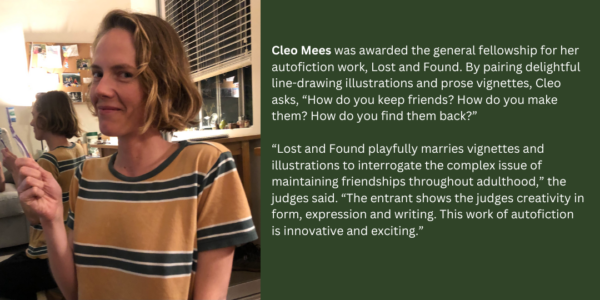
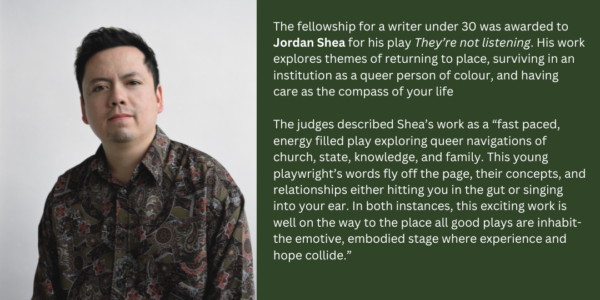
The fellowship for a writer under 30 was awarded to Jordan Shea for his play They’re not listening. His work explores themes of returning to place, surviving in an institution as a queer person of colour, and having care as the compass of your life. The judges described Shea’s work as a “fast paced, energy filled play exploring queer navigations of church, state, knowledge, and family. This young playwright’s words fly off the page, their concepts, and relationships either hitting you in the gut or singing into your ear. In both instances, this exciting work is well on the way to the place all good plays are inhabit- the emotive, embodied stage where experience and hope collide.”
The two runners up were Jenny Blackford for her poetry collection, Reserves of Coping, and Emily Meller for her collection of short stories, Surfacing.
Jenny Blackford’s entry offered the reader “a series of relationships and connections that are at their heart honest, powerful, and beautiful in their simplicity and clarity. This poet has a special ability to have you hovering both above and within their lines, held in place by a joyful lightness and wonderful weight and of their touch upon the page,” said the judges.
“Surfacing presents a collection of stories about female experience and the ways women are perceived and given voice in literature, asking what it takes for a woman ‘to be more than a series of surfaces, blank spaces, or literary devices’. The author’s writing is measured and sophisticated, observing with a quiet wit the ambiguities, silences and shifting power relations between her subjects.”
The judges for this year’s fellowships were Yuwaalaraay author, Nardi Simpson; associate publisher at Giramondo, Nick Tapper; and Writing NSW project & communications officer, Martyn Reyes.

